Who is Nimisha Priya? Indian nurse sentenced to death in Yemen for murder

Nimisha Priya, who is sentenced to death in Yemen, is a trained nurse and has worked in private hospitals in Yemen for a few years
Delhi Weather Update: Cold wave intensifies in Delhi-NCR, temperature on New Year’s Eve drops to…

On December 31, 2024, Delhi’s air quality has deteriorated to the “poor” category, with an overall Air Quality Index (AQI) of 236 recorded at 8 AM.
Learning Curve: The new players in Congress

Every two years, the period between the November election and when the new Congress begins is often the busiest swath of time for covering Congress. Reporters are trying to figure out who won their elections and who lost. The existing Congress is back, attempting to prevent a government shutdown and often plowing through a landscape of other major legislation. There are often leadership elections. For instance, Sen. John Thune, R-S.D., defeated Sen. John Cornyn, R-Tex., and Rick Scott, R-Fla., to succeed outgoing Senate Minority Leader Mitch McConnell, R-Ky., as the top GOP leader in the Senate. Thune begins as Majority Leader Friday afternoon. We still don’t know how much of a struggle House Speaker Mike Johnson, R-La., faces returning to the Speaker’s suite. It took former House Speaker Kevin McCarthy, R-Calif., 15 rounds before he claimed the Speaker’s gavel in 2023. Time management is a problem for me with so much going on. The new Congress starts at noon on January 3. So I spend the time between the election and the beginning of the new Congress learning, studying and memorizing the faces and biographies of as many incoming lawmakers as possible. It’s time-consuming. It’s a challenge distinguishing some rookies from one another. Even getting the names and pronunciations right. REP. VICTORIA SPARTZ DEMANDS ‘ASSURANCES’ SPEAKER JOHNSON ‘WON’T SELL US OUT TO THE SWAMP’ It’s quite a learning curve. This process intensifies during the holidays. It’s the final ramp-up to the launch of things on January 3. Some people are easier to learn than others. Sens. Andy Kim, D-N.J., and Adam Schiff, D-Calif., were household names in the House before joining the Senate. In fact, they’ve already become senators. Other new senators are high-profile because they ran in competitive races. Think Sens.-elect Bernie Moreno, R-Ohio, Tim Sheehy, R-Mont., and Dave McCormick, R-Penn. Sen.-elect Jim Justice, R-W.V., didn’t face a challenging race to join the Senate. But Justice cut a national profile before winning – as did his constant canine companion Babydog. But the real adventure is learning all of the new House Members. The House is an enormous place. 435 people. Some new faces stand out in the House. But many are obscure. And it’s especially hard to learn some of them if they didn’t encounter a competitive race or were relative unknowns. The House begins with 62 new Members plus non-voting delegates on Friday. My mission is to learn them all. My daily workout routine is a good opportunity for this. After all, the pace of Congress is kind of like a treadmill. But for my purposes, learning the freshman class is more like an elliptical. I go through the list of faces and names over and over again – as my legs churn each morning. I rotate through the entire House roster at least twice. I then carry the list to the stationary bike and study more there. Some names are more prominent than others. For instance, Rep.-elect Nick Begich III, R-Alaska, was known before the election. He defeated Rep. Mary Peltola, D-Alaska, in a close race this fall. In addition, his surname is steeped in American political history – but mostly with the Democratic Party. His uncle is former Sen. Mark Begich, D-Alaska. His grandfather, the late Rep. Nick Begich, D-Alaska, was killed in a 1972 plane crash with late House Majority Leader Hale Boggs, D-La. Boggs is the father of late ABC and NPR journalist Cokie Roberts. TRUMP GIVES JOHNSON ‘COMPLETE AND TOTAL ENDORSEMENT’ AHEAD OF SPEAKERSHIP FIGHT I try to meet as many Members of the incoming freshman class as possible. But as I wrote earlier, bandwidth is limited. The freshmen all descend on the Capitol complex during this zany period after the election for orientation. There just aren’t enough minutes in the day. But I was grabbing a drink with a good friend at The Monocle, a legendary Capitol Hill watering hole, a few weeks ago. I saw former Sen. Begich walk in – but couldn’t get his attention to say hello. A few moments later, the Congressman-elect walked by. I grabbed him by the arm, introduced myself and gave him a business card. Trust me: it is easier to memorize the freshman class if you meet members in person. And I was proud of myself for being able to pick out Rep.-elect Begich in a crowd – based on my studies. I spent a little time chatting with Reps.-elect Julie Fedorchak, R-N.D., and Dave Taylor, R-Ohio. So I’m confident in knowing those members. Then there are people who left Congress – and are back. Such is the case with former Reps. Marlin Stutzman, R-Ind., and Cleo Fields, D-La. Stutzman served in Congress just a few years ago and is returning. Fields served in the House nearly three decades ago in the 1990s when he was in his thirties. I mentioned delegates a bit earlier. Del.-elect Kimberlyn King-Hinds, R-Northern Mariana Islands, comes to Washington as a freshman in a few days. She succeeds retiring Del. Kilili Sablan, D-Northern Mariana Islands. I have not met King-Hinds yet. But multiple photos passed around show her wearing a tropical floral headpiece. I don’t know if that’s what King-Hinds wears all the time. But such apparel would make it easier to recognize King-Hinds. For instance, the signature cowboy hat worn by Rep. Frederica Wilson, D-Fla., makes her stand out. GERMANY ACCUSES ELON MUSK OF TRYING TO INTERFERE IN ITS NATIONAL ELECTIONS Then there are the pronunciations. Not every name is as easy as Rep.-elect Tim Moore, R-N.C., or Rep.-elect Gabe Evans, R-Colo. Try Rep.-elect Suhas Subramanyam, D-Va. It’s pronounced soo-bruh-MAHN—yum. The surname of Rep.-elect Abe Hamadeh, R-Ariz., is pronounced HAMM-uh-day. And the aforementioned Julie Fedorchak says her last name fedd-ORR-check. I conscripted Fox News Radio reporter Ryan Schmelz to quiz me on the backgrounds of some of the freshman – as well as match photos with names. I had no problem guessing correctly when Schmelz showed me the photo of Rep.-elect Sarah Elfreth, D-Md. She succeeds retiring
Trinidad and Tobago announces state of emergency to combat gang violence
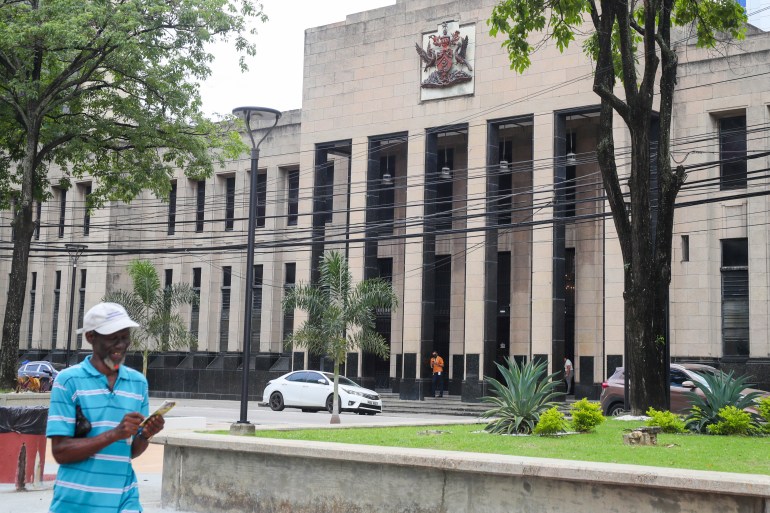
The Caribbean republic of Trinidad and Tobago has announced a state of emergency in response to a spike in gang violence over the weekend. The declaration grants police additional powers as they seek to tamp down on reprisal killings and other gang-related activity. “The declaration and calling of a public state of emergency is something that is not taken lightly,” said acting Attorney General Stuart Young at a news conference on Monday. He explained that information from the Trinidad and Tobago police service “dictated and mandated the necessity of this extreme action that we took this morning”. The state of emergency empowers the country’s police to arrest people “on suspicion of involvement in illegal activities”. It will also allow law enforcement to “search and enter both public and private premises” and suspend bail. A government statement specified that no curfew would be imposed, and the freedom to meet publicly or demonstrate in marches would not be impeded. The government of Trinidad and Tobago linked the state of emergency to gang violence on its islands [File: Ash Allen/AP Photo] Young indicated that an uptick in violence over the weekend in the capital, Port of Spain, helped prompt the emergency announcement in the early hours of Monday. Advertisement “You will recall that on Saturday, just after 3 o’clock in the afternoon outside the Besson Street police station, there was a shooting with the use of a high-calibre automatic weapon,” Young explained. Local media described the shooting as an ambush. A suspected gang leader, Calvin Lee, had arrived at the police station to sign the bail book, but as he and his entourage left, The Daily Express reported that gunmen emerged from a nearby van and began to fire. One person was killed. Lee himself managed to flee. But Young explained that the shooting led to reprisal killings between local gangs. Within 24 hours, he said, six people were fired upon in Laventille, a suburb of Port of Spain. Five of them were killed. Young said further reprisal attacks are still anticipated. “There can be expected heightened reprisal activities by the criminal elements in and around certain places in Trinidad and Tobago that immediately warranted and took us out of what we can consider the norm,” he explained. He declined to name specific locations where gang activity may be concentrated. “But I can say, throughout Trinidad and possibly Tobago, [criminal gangs] are likely to immediately increase their brazen acts of violence in reprisal shootings on a scale so extensive that it threatens persons and will endanger public safety.” Young added that the decision to invoke a state of emergency was in part a result of the high-calibre weapons being used in the attacks, which elevated the possibility of bystander deaths. Advertisement He noted the involvement of AK-47 and AR-15 guns. “Over the last month or so, and in fact building up to this, the government has been concerned about the use of high-powered, illegal firearms — high-calibre firearms including automatic weapons that unfortunately are a scourge throughout the whole Caribbean region,” Young said. Caribbean countries do not manufacture firearms themselves, and many of the guns used in gang violence have been illegally imported. One source in particular stands out: the United States. It is the largest weapons exporter in the world. In March, the Stockholm International Peace Research Institute found that the US was the source of approximately 42 percent of global arms exports. A 2017 analysis from the Small Arms Survey also found that the US had the largest number of private guns per capita, with US civilians holding 40 percent of the world’s firearms. Guns from the US have been connected to crimes across the Caribbean, from Haiti and Jamaica to Trinidad and Tobago. The US has collaborated with 13 Caribbean countries to help disrupt the illegal firearms trade. Between 2018 and 2022, an estimated 7,399 firearms collected from crimes in the region have been sent to the US for origin tracing. In October, the US Government Accountability Office published a report with its findings. Of all the firearms retrieved and traced during that four-year period, a total of 5,399 — or 73 percent — originated from the US. A couple hundred more had ambiguous origins. Advertisement The proliferation of illegal firearms has been linked to increased violence in the Caribbean. Trinidad and Tobago, for example, has been struggling with a record homicide rate. In December alone, there were 61 homicides, according to the government. The country tallied 623 homicides total so far for 2024. “Gangs accounted for 263 of them,” MP Fitzgerald Hinds, the minister of national security, said during Monday’s news conference. “So as a result, we consider that this declaration of a public emergency is to confront the criminals and to allow law enforcement easier access than ordinary to them, in light of the crises they have presented to this country.” Adblock test (Why?)
China blamed by US for Treasury Department hack

Unclassified documents were stolen after a hack earlier this month, according to a letter sent by Treasury to Congress. Chinese state-sponsored hackers were able to steal unclassified documents from United States Treasury workstations earlier this month, the US Treasury Department has said. The department said on Monday that the hackers were able to compromise a third-party cybersecurity service provider and gain access to the documents in what it described as a “major incident”. “[The hackers] gained access to a key used by the vendor to secure a cloud-based service used to remotely provide technical support for Treasury Departmental Offices (DO) end users,” a letter sent by the US Treasury Department to Congress said. “With access to the stolen key, the threat actor was able to override the service’s security, remotely access certain Treasury DO user workstations, and access certain unclassified documents maintained by those users.” A statement from the Treasury said that the department “takes very seriously all threats against our systems, and the data it holds”. The Treasury Department was alerted to the hack by the cybersecurity provider, BeyondTrust on December 8. The department says it is working with the US Cybersecurity and Infrastructure Security Agency (CISA) and the FBI to assess the impact of the hack. Advertisement “The compromised BeyondTrust service has been taken offline and there is no evidence indicating the threat actor has continued access to Treasury systems or information,” a spokesperson for the Treasury Department told AFP. The letter to the leadership of the US Senate Banking Committee directly accused China, saying that the incident had been “attributed to a China state-sponsored Advanced Persistent Threat (APT) actor”. An APT is a cyberattack where the hacker can maintain undetected and unauthorised access to a target for a period of time. The Treasury Department said that more information would be released in a supplemental report at a later date. The report of the hack comes less than a month ahead of the inauguration of US President-elect Donald Trump. Trump has threatened China with a trade war and tariffs, saying that Beijing had not done enough to stop the flow of the opioid fentanyl to the US. Both Trump’s Republicans and the Democrats have warned against Chinese threats against the US, particularly in the realm of cybersecurity. In September, the US Justice Department said that it had stopped a cyberattack network run by Chinese-backed hackers that had affected 200,000 devices worldwide. And earlier in December, the US sanctioned a Chinese cybersecurity firm and a researcher over a 2020 attack that attempted to exploit a computer software vulnerability in company firewalls. China has denied any involvement in the attacks and says that it opposes all forms of cyberattacks. Advertisement Adblock test (Why?)
South Korean court issues arrest warrant for Yoon over martial law decree
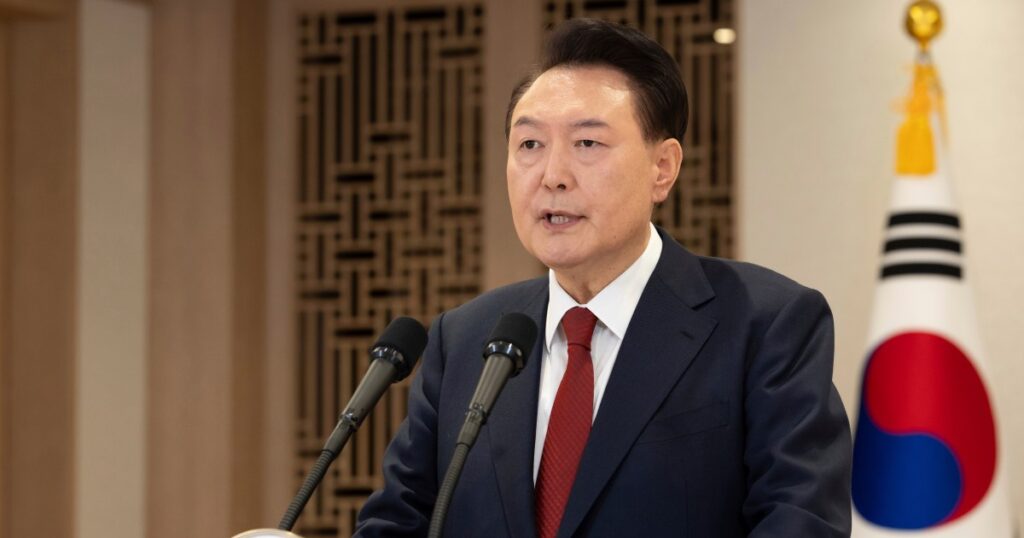
BREAKINGBREAKING, Court’s issuance of warrant marks first time South Korean authorities have sought to detain a sitting president. A South Korean court has issued an arrest warrant for impeached President Yoon Suk-yeol over his short-lived declaration of martial law in a historic first. Seoul Western District Court on Tuesday approved the warrant following an earlier request by the Joint Investigation Headquarters, which is investigating the embattled South Korean leader for insurrection and abuse of power. “The arrest warrant and search warrant for President Yoon Suk Yeol, requested by the Joint Investigation Headquarters, were issued this morning,” the Joint Investigation Headquarters said in a statement. The move marks the first time authorities have sought to detain a sitting South Korean president. It is unclear when authorities might attempt to take Yoon into custody. Yoon’s security detail has previously blocked investigators from executing a number of search warrants at the presidential office compound and the president’s official residence. South Korean media have speculated that Yoon is unlikely to be arrested imminently as authorities will probably seek to coordinate with the presidential security service. Advertisement Yoon faces possible life imprisonment, or even the death penalty, over his brief imposition of martial law on December 3, which has plunged the East Asian nation into its biggest political crisis in decades. Yun Gap-geun, a lawyer for Yoon, said in a statement that the warrant was “illegal and invalid”, arguing that the CIO does not have authority to investigate the president. Kwon Sung-dong, the floor leader of Yoon’s People’s Power Party, also criticised the court’s decision to issue a warrant, describing it as “inappropriate”. Yoon has been suspended from his duties since December 14, when the National Assembly voted for his impeachment in a 204-85 vote. In a deepening of the country’s leadership crisis, the opposition-controlled legislature on Friday voted to also impeach acting president Han Duck-soo, passing presidential authority to Deputy Prime Minister and Finance Minister Choi Sang-mok. The Democratic Party and several minor opposition parties voted to impeach Han over his refusal to immediately appoint three justices to fill vacancies on the Constitutional Court, which is deliberating whether to uphold Yoon’s impeachment. The court has up to six months to make its decision, after which Yoon will either be removed from office or restored to the presidency. Adblock test (Why?)
Texas public safety department announces systemwide outage, closes driver license offices
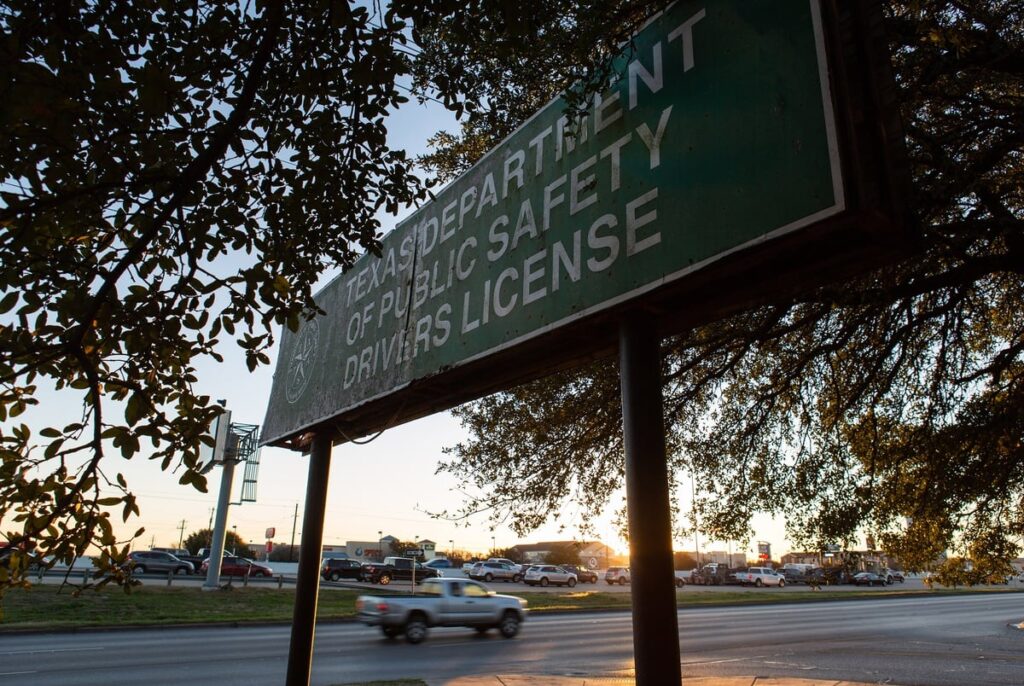
The outage appeared only to affect the public safety department. Websites for other state agencies were operational Monday evening.
Weather Update: Delhi, nearby regions brace for chilly New Year 2025, check IMD forecast here

According to the Meteorological department, there is a prediction of these conditions remaining in place until January 1. These conditions will impact visibility and lower daytime temperatures.
ICE shuts down programs offering services to illegal immigrants, citing ‘immense’ costs
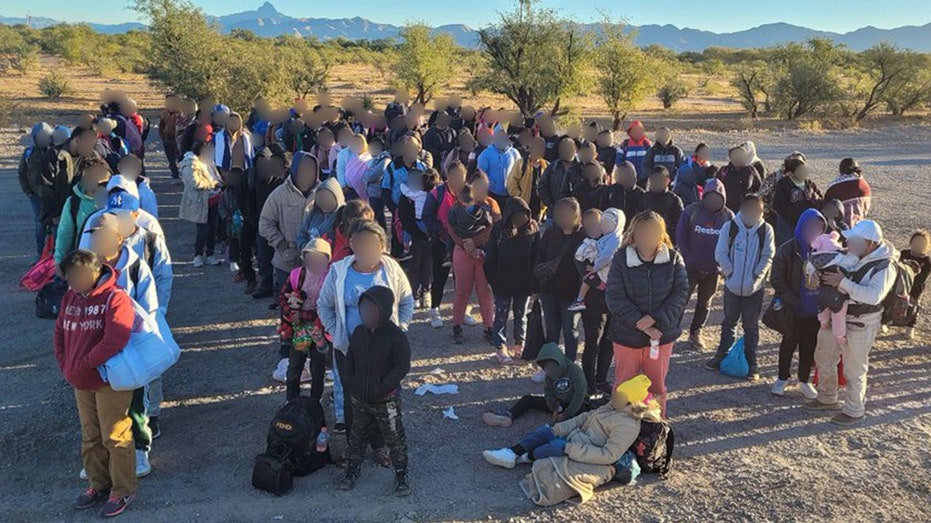
EXCLUSIVE: Immigration and Customs Enforcement (ICE) has ended two programs that provide social services to illegal immigrants who are released into the U.S. interior, telling lawmakers that one brings “immense cost with little improvement” and that another is out of line with ICE’s mission. The agency responded to Rep. Byron Donalds, R-Fla., and 15 members of Congress, who wrote to ICE in May asking for more information about the “Alternatives to Detention” program, which monitors illegal immigrants not in ICE detention. The agency defended the program and said it was “an efficient and effective” program for monitoring a segment of illegal immigrants on ICE’s non-detained docket. ICE only has around 40,000 beds available to it at one time, while it has a non-detained docket of nearly 7.7 million people – a number that has soared during the Biden administration. Of those, just over 181,000 are enrolled in Alternatives to Detention monitoring program, where migrants are monitored either by an app check-in or a GPS monitor. ICE DEPORTATIONS CATCH UP TO TRUMP-ERA NUMBERS IN FY 2024 AS BIDEN ADMIN COMES TO A CLOSE But in recent years, the agency has also created separate programs to offer various services and assistance to those not in detention. In the letter, the agency says that some of those programs are ending. One is the Wraparound Stabilization Service (WSS), which ICE says began in February 2020 and involves working with NGOs to offer “services that provide psychosocial and behavioral health support for vulnerable participants and their families who would benefit from additional stabilization services.” ICE says the program stopped referrals in July, and that the program was ineffective in what it sought to do, having only a 2% higher compliance rate from those who took part in services compared to those who did not. TRUMP’S TRANSITION TEAM EYES EXPANSION OF ANKLE MONITORS FOR ILLEGAL IMMIGRANTS NOT IN CUSTODY “ICE Enforcement and Removal Operations [ERO] notes the challenge with the WSS was its immense cost with little improvement,” it says. “As a result, ERO determined WSS was not cost effective enough to continue paying for these services when they did not benefit ICE or help the agency further its mission.” ICE had previously cited difficulties with the program including a cumbersome identification and referral process, a substantial increase in participants and a lack of resources. CLICK HERE FOR MORE COVERAGE OF THE BORDER SECURITY CRISIS The agency also says it had decided in June not to continue a vendor contract for the Young Adult Case Management (YACMP) program. That program offered 18-and 19-year-old migrants legal services, screenings, referrals to social service programs and human trafficking screenings. It started in 2023 and was present in 16 cities. “In addition to fiscal limitations, a review of the program revealed that YACMP does not align with ERO’s mission or priorities. In short, ERO took steps to realign or stop using programs to address the budget challenges facing the agency,” the agency’s letter says. The letter also provided information about the operation of the ATD tracking by app or GPS, known as the Intensive Supervision Appearance Program (ISAP). ICE said that 98.6% of those with court tracking appeared at their court hearings overall, while 90.4% appeared for final hearings. As of September, 13.2% of participants were being tracked by a GPS ankle or wrist device, and the average length on the program was 511.9 days. Lawmakers had also asked about those who were charged or convicted of crimes while enrolled in ATD. The agency said that in FY 2024, there were 3,913 charges and 688 convictions for those in the program, including 10 sex offense convictions, 364 traffic offense convictions, two homicide convictions, four kidnapping convictions and 65 assault convictions. The incoming Trump administration is eyeing a substantial increase in deportations, with President-elect Trump having promised a “historic” mass deportation operation. Fox Digital also reported this month that it wants to reduce numbers not in detention, while also increasing the use of ankle monitors on those who cannot be detained. Conservatives responded to the information provided to lawmakers by calling on the new administration to scrap even more programs providing services for illegal immigrants. “ICE is a law enforcement agency not a charity. The billions of dollars DHS has wasted to bring millions of illegal aliens into the country and provide them excessive amenities should be redirected to getting every illegal alien safely back to their home country,” Lora Ries, director of The Heritage Foundation’s Border Security and Immigration Center, told Fox News Digital. Ries called the services a “boondoggle” and said “there are several other similar initiatives that must meet the same fate under President Trump.” “Instead of wasting taxpayer dollars in conflict with an agency mission, we should see a massive increase in resources for detaining and deporting illegal aliens. If you don’t support the agency’s mission, you shouldn’t get a dime,” she said.
‘Guardian Angels’ founder slams New York sanctuary city policies after woman set on fire
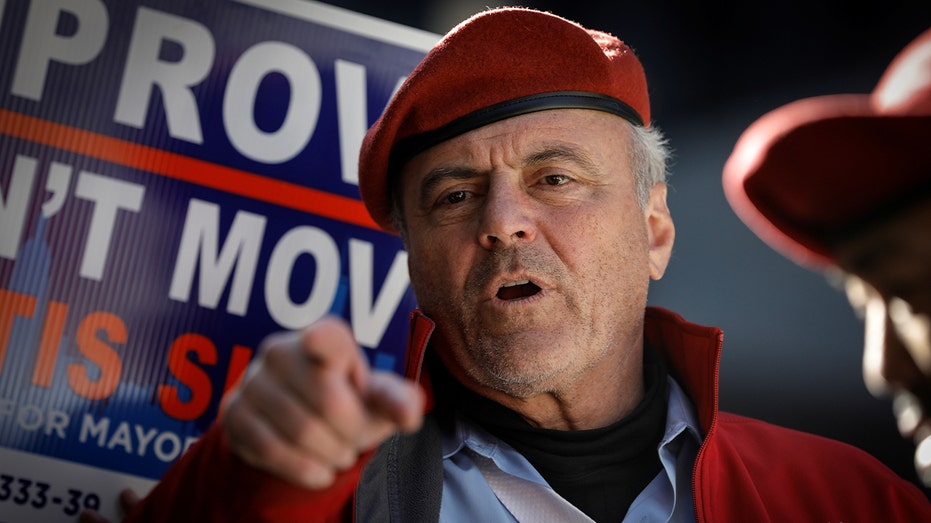
After announcing his citizen law enforcement group, the “Guardian Angels,” would be returning to patrol the New York subway, Curtis Sliwa is pushing back against New York Mayor Eric Adams and slamming the city’s migrant sanctuary policies, saying: “We’re in a crime crisis.” Sliwa announced the Guardian Angels would be resuming safety patrols on New York subway trains after a woman was burned to death on the New York City subway during Christmas week. The New York Post reported Sliwa saying the group would resume its patrols of the subway, walking up and down the inside of the trains “day and night.” The Guardian Angels founder called the brutal subway murder the “deadly consequences of NYC remaining a sanctuary city.” “We have 56,000 migrants identified as criminals by ICE roaming our streets, and vulnerable homeless folks left sleeping on our subways because shelters are filled and dangerous,” he said on X. “But Adams and City Hall pretend the city is safe and under control! While everyday New Yorkers see disturbing crime right before our eyes every single day!” CRITICS SPECULATE WHY BYSTANDERS FAILED TO SAVE WOMAN BURNING ON NYC SUBWAY: ‘DANIEL PENNY FACTOR’ | FOX NEWS VIDEO Recognizable by their distinctive red berets and jackets, Sliwa founded the Guardian Angels in 1979, and the group became a regular presence on the subway during many of the city’s most crime and homicide-ridden years. Currently, murders on the New York City subway are up by 60%, according to the New York Post. The outlet reported in September that eight people had been killed on subway trains in New York City, up from five during the same period in 2023. After last week’s brutal killing, Sliwa announced the Guardian Angels would be making a return to the New York subway and beefing up its presence on trains throughout the city. He said group members would be conducting wellness checks on homeless individuals and alerting police and subway authorities when there are problems. “We’re going to have to increase our numbers, increase the training and increase our presence as we did back in 1979,” said Sliwa. “We went from 13 to 1,000 back then within a period of a year. Because the need was there. The need is here now once again. We’re going to step up. We’re going to make sure we have a visual presence just like we had in the ’70s, 80’s and ’90s.” SUSPECT ACCUSED OF BURNING WOMAN TO DEATH ON NYC SUBWAY IS PREVIOUSLY DEPORTED ILLEGAL IMMIGRANT Despite this, Adams’ office slammed the Guardian Angels’ announcement. Kayla Mamelak Altus, a representative for Adams, told Fox News Digital that the mayor has “surged 1,000 police officers per day into the subways, has brought down overall crime, and transit crime, delivering real action — not theatrics.” “Mayor Adams is committed to improving the lives of New Yorkers, which is why he frequently rides the subway to speak directly with everyday riders about how we can make it safer,” said Altus. “But he knows there’s still more work to be done,” Altus added. “Unlike others who only seek attention with meaningless stunts, Mayor Adams remains focused on real solutions.” MAYOR ADAMS CALLS FOR THE ‘INVOLUNTARY REMOVAL’ OF PEOPLE WHO ARE ‘A DANGER TO OTHERS’ ON THE STREETS In response, Sliwa urged Adams to station more police officers in the subway and challenged the mayor to join him in doing regular daily patrols on the subway to see how bad the problems have gotten since the surge in migrants in the city. “Head into the subway and patrol yourself,” Sliwa said, speaking directly to Adams. “I’ll match him. I go four hours a day, even with my busy schedule. The mayor has a busy schedule. He can run one patrol with his police. I’ll run a patrol with the Guardian Angels. That’s two more patrols we will have that we didn’t have before.” “We’re in a crime crisis, and the mayor should be happy to accept anybody’s help at this time,” he told Fox News Digital. “So, if we’re willing to patrol on the subways where it’s desperately needed in the cars as they’re moving, why would the mayor or anyone say it’s theatrics?” “The mayor and the governor have not met their primary responsibility, which is to provide public safety to the people in the subway,” he went on. “So, if you’re unwilling to do the job or maybe you can’t and won’t admit it, they should be welcoming all the help they can get from an organization that is renowned for 46 years of service to New Yorkers, asking nothing in return.” DR. PHIL WITNESSES TENSE HOMELESS ALTERCATION WHILE TOURING SUBWAY WITH MAYOR ADAMS CLICK HERE TO GET THE FOX NEWS APP He said that most of the attacks are being carried out by “emotionally disturbed people” who live in the subways. “These attacks can occur anytime, anywhere, any place, to anybody, in any part of this city, and especially the subway,” he explained. “Shame on us for letting that happen. We need to rescue these people and get them mental health care. Shame on the fact that the mayor spent billions of our tax dollars housing migrants, but not our own citizens who live in the subways. The subway trains have become moving hotels. “If the mayor was doing a good job… nobody would be asking for the Guardian Angels to patrol the subways,” he added. “The people want police, and if they don’t have police, they’re more than happy to accept the service of the volunteer Guardian Angels.”

